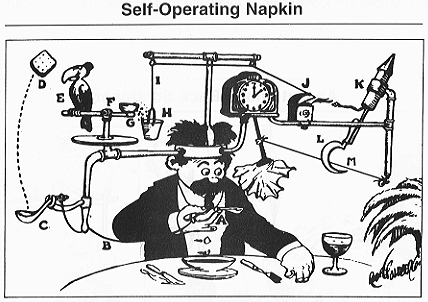On March 18, 2008 – a decade ago this week – Joseph Herscher, a scrawny New Zealander with frazzled hair, uploaded a video to YouTube called Creme That Egg! In the amateurishly low-resolution one-shot take, you can watch a convoluted mechanism take two and a half minutes to roll marbles across paper funnels propped up by taut strings to ultimately smash a Cadbury Creme Egg with a hammer. Ten years and three million views later, that video launched Herscher’s comedic career under the banner of Joseph’s Machines.
Herscher creates what are known as Rube Goldberg machines – absurdly complicated devices that perform simple tasks in illogical ways, named for the Pulitzer Prize-winning cartoonist who popularized the concept.
Herscher’s egg-smashing video, which he estimates took 200 takes to get right, was his first foray into this particular world of absurd comedy. “I spent seven months on the thing,” he told the New York Times in 2012. “I didn’t know why. I didn’t have a plan.”
But his instant YouTube success propelled him to minor stardom in those early days of social media, and he earned notoriety in his native New Zealand. Herscher was invited to the 2011 Venice Biennale, where in five days he conceived a 40-foot-long, side-scrolling experience that used dozens of garden tools and flowerpots to eventually water a plant. In the YouTube video, you can hear the audience cry out when the machine looks like it’s stopped working, moments before it regains momentum, causing everyone to erupt in cheers.
Those moments of tension – when you’re staring in disbelief that the mechanism will work, though it genuinely seems like it won’t – are the most exciting. Watching his machines slow down and pick up speed, ebbing and flowing with an unexpected kind of beauty, calls to mind Marx brothers Harpo and Chico fluidly swapping hats with the jerky popcorn vendor in Duck Soup, or Harold Lloyd dangling from the clock’s hands at the end of Safety Last!
Indeed, while Herscher has called himself a “kinetic artist,” the tumultuous flow of his work recalls the great slapstick artists of the 1920s and ’30s. In his early videos, his poofy moustache, windswept hair and imperfect teeth – all bundled up in a slimming blazer and vest, as he appears in his nine-million-times-viewed magnum opus The Page Turner – transform him into the perfect millennial mad scientist, a harmlessly quirky indoor adventurer.
READ: THE 100 JOKES THAT SHAPED MODERN COMEDY ARE MOSTLY JEWISH
The scatterbrained geek vibe seems to have worked better for him than the kinetic artist angle. After appearing on Sesame Street in 2013, Herscher starred in a four-part children’s web series, Jiwi’s Machines, where he swapped his moustache for a bow tie and inadvertently terrorized his sister in their booby-trapped house.
Comedy, particularly for Jews, has always been equal parts defence mechanism and icebreaker, a way of drawing from a profound anxiety about our place in the world and exporting it as skittish gestures and social dysfunction. In the 20th century, the jokes began resonating with a broader public, as people realized that existential angst was not a uniquely Jewish trait.
In that same vein, the success of Herscher’s performance highlights something only a few up-and-coming comedians are realizing: social media is perfect for silent comedy. Digital is the new television, and the universal gags are transcending international borders, cultures and languages.
It’s no coincidence that Herscher, despite starting on YouTube a decade ago, has garnered just 130,000 subscribers there, as opposed to the million he’s got on Facebook. Facebook videos, after all, autoplay with the sound off.
But if you do find his work there, do yourself a favour and turn the sound on. It’s the only way you’ll hear the song that signs off each video, a buoyant French-language klezmer number called Tchavolo Swing by the Jews Brothers Band, sung by Herscher’s mother – a quiet nod to the tradition of Jewish goofballs who came, and stumbled around, long before him.
